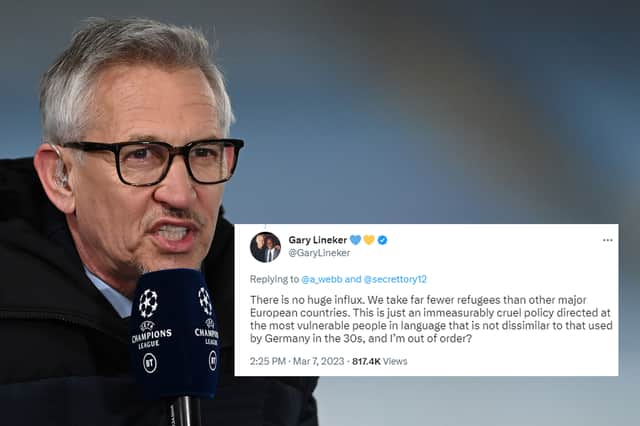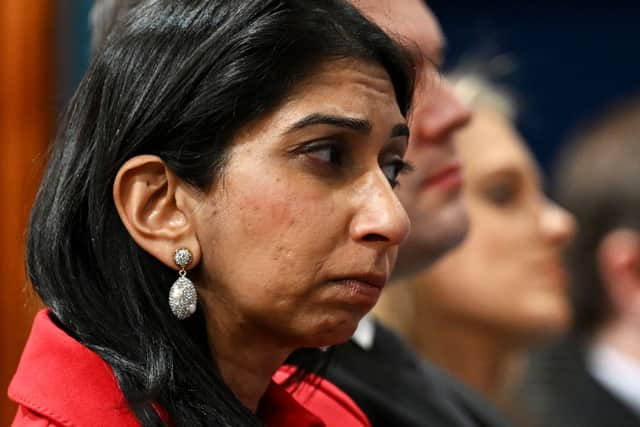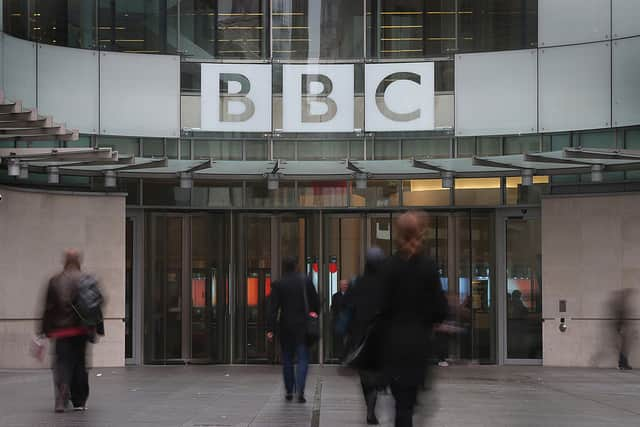Gary Lineker: UK asylum crackdown controversy explained - BBC response to comments on Nazi Germany
and live on Freeview channel 276
Gary Lineker is to return to presenting sport on the BBC after he was taken off air over a tweet in which he seemingly compared the UK government’s controversial new asylum policy to Nazi Germany.
Commenting on a video posted by Suella Braverman on Twitter, in which she unveiled the Home Office’s plans to stop migrant boats crossing the Channel, the Match of the Day host said the language being used was “not dissimilar to that used by Germany in the 1930s”.
Advertisement
Hide AdAdvertisement
Hide AdAfter the ex-footballer told reporters outside his home in London that he “of course” stood by his comments, the BBC announced on Friday (10 March) that Lineker would not present flagship show Match of the Day until an agreement could be made over his use of social media. This was followed by chaos for the BBC, with pundits such as Ian Wright, Alan Shearer, and Alex Scott stepping down from their weekend presenting duties in solidarity with their colleague.
Tim Davie, director general of the BBC, apologised on Monday (13 March) for the widespread disruption to sports programming over the weekend - and announced an independent review of the corporation’s internal social media guidelines. He also confirmed that Lineker would return to screens this Saturday (18 March).
“Everyone recognises this has been a difficult period for staff, contributors, presenters and, most importantly, our audiences,” said Mr Davie. “I apologise for this. The potential confusion caused by the grey areas of the BBC’s social media guidance that was introduced in 2020 is recognised. I want to get matters resolved and our sport content back on air.”


Lineker wrote in a statement on Twitter: “After a surreal few days, I’m delighted that we have navigated a way through this. I want to thank you all for the incredible support, particularly my colleagues at BBC Sport, for the remarkable show of solidarity. Football is a team game but their backing was overwhelming.
Advertisement
Hide AdAdvertisement
Hide Ad“I have been presenting sport on the BBC for almost 3 decades and am immeasurably proud to work with the best and fairest broadcaster in the world. I cannot wait to get back in the MOTD chair on Saturday.
“A final thought: however difficult the last few days have been, it simply doesn’t compare to having to flee your home from persecution or war to seek refuge in a land far away. It’s heartwarming to have seen the empathy towards their plight from so many of you.”
In case you missed it, here’s everything Gary Lineker has said about the government’s new crackdown on small boats crossings - as well as how the government, politicians, and the BBC reacted.
What did Gary Lineker say?
Initially, Lineker retweeted a video put out by Braverman, in which she outlines the government’s new ‘Illegal Migration Bill’. The presenter’s retweet was accompanied by the comment: “Good heavens, this is beyond awful.”
Advertisement
Hide AdAdvertisement
Hide AdIn the video, Braverman explains the government’s proposed new legislation, which would see migrants deemed to have arrived ‘illegally’ in the UK swiftly detained without bail or judicial review for 28 days. These migrants would subsequently be removed from the country “within weeks“ - never allowed to return to the UK.
Many charities have objected to the policy, with the United Nations High Commissioner for Refugees arguing it amounts to an effective ‘asylum ban’. EU Commissioner Ylva Johansson has also said she believes the plan “violates” international law.
When challenged on his tweet by another social media user who claimed he was “out of order”, Lineker defended his comments. He said: “There is no huge influx [of migrants]. We take far fewer refugees than other major European countries. This is just an immeasurably cruel policy directed at the most vulnerable people in language that is not dissimilar to that used by Germany in the 30s, and I’m out of order?”
It is not clear which language in particular Lineker was referring to, but Braverman’s video and accompanying caption included the words “enough is enough” and “we must stop the boats”.
Advertisement
Hide AdAdvertisement
Hide AdLater on Wednesday (8 March), in response to the more high-profile criticism he received, Lineker tweeted: “Great to see the freedom of speech champions out in force this morning demanding silence from those with whom they disagree.”
He followed up shortly after with: “I have never known such love and support in my life than I’m getting this morning (England World Cup goals aside, possibly). I want to thank each and every one of you. It means a lot. I’ll continue to try and speak up for those poor souls that have no voice.”
On Thursday (9 March), as the presenter left his home in London, he responded “no” when asked by reporters if he fears suspension over his tweets. Then, as he climbed into his car, he told a reporter who asked if he had spoken to the BBC that he is “always talking to the BBC.”
Before closing the door, he was asked if he regretted his tweet, to which he responded “no”. Questioned on whether he stood by it, Lineker replied: “Course.”
Advertisement
Hide AdAdvertisement
Hide AdAfter it was announced that he would be returning to Match of the Day, Lineker posted a long statement on Twitter to say he was “delighted” that he and the BBC have “navigated a way through this”. He also spoke out for refugees, remarking that “however difficult the last few days have been, it simply doesn’t compare to having to flee your home from persecution or war.”
What was the reaction?
Lineker’s initial post on Twitter was shared and ‘liked’ by tens of thousands of users, with many replying “spot on” and “nailed it”. One wrote: “Well said. I salute you for your frank and honest words. It cannot be easy to tell it how it is in a position like yours. Stand firm. You have a wonderful moral compass and are a fine example for many young people who follow you.”
The presenter also received support from some well-known figures in media. Piers Morgan stated in a Talk TV monologue that he had “no problem” with Lineker expressing his personal views online, explaining: “Gary got a bit carried away, as he tends to do. We get into it quite regularly, this is what he does and he would say the same about me. We both have strong opinions, we both believe in what we say and we express them forcefully, but we agree to disagree.”
He went on to say that had Lineker made his remarks while presenting Match Of The Day, the criticism would have been “justified”. But as he did not, and since he is “not a news reporter”, he did not see an issue.
Advertisement
Hide AdAdvertisement
Hide AdMeanwhile, Sky News commentator Adam Boulton added: “Seems to me @GaryLineker is entitled to say what he likes @Twitter - he’s not a political reporter. Just like the frequently voiced views of BBC actors.”
However, Lineker’s commentary was widely condemned by government ministers and Tory MPs. Braverman responded directly to the comments, telling BBC Breakfast: “I’m disappointed, obviously. I think it’s unhelpful to compare our measures, which are lawful, proportionate, and - indeed - compassionate, to 1930s Germany. I also think that we are on the side of the British people here.”


Similarly, Downing Street said the ex-footballer’s criticism of the new asylum policy was “not acceptable”, while Culture Secretary Lucy Frazer said Lineker’s tweets were “inappropriate” - as the BBC must retain impartiality “if it is to retain the trust of the public who pay the licence fee”.
Immigration Minister Robert Jenrick told Times Radio that Lineker was “far out of step” with the public sentiment on small boat crossings, remarking: “My children are the grandchildren of Holocaust survivors, and I think those sorts of words should not be thrown around lightly.”
Advertisement
Hide AdAdvertisement
Hide AdConservative deputy chairman Lee Anderson echoed these sentiments, writing on Twitter: “To use the Nazi word in this context is disgusting and vile. The BBC should disassociate themselves from these types of comments and ask themselves the question ‘is this the type of comment they expect from their publicly funded presenters?’ Awful.”
Brendan Clarke-Smith, Tory MP for Bassetlaw, added: “This is not just insulting to the generosity of Brits, but also grossly offensive to the victims of one of the most evil regimes in history. Lineker is out of order and needs to get out of his metropolitan bubble.”
Meanwhile, Labour said comparisons with Germany in the 1930s “aren’t always the best way to make” an argument.
What has the BBC said?
In its initial response to the controversy surrounding Lineker, the BBC said it was taking the matter “seriously” and “expects to have a frank conversation” with the presenter - in which he will be “reminded of his responsibilities”.
Advertisement
Hide AdAdvertisement
Hide AdBut things escalated when on Friday (10 March), the broadcaster announced that Lineker would not present Match of the Day as usual on Saturday (11 March). A spokesperson said the BBC had been “in extensive discussions with Gary [Lineker] and his team in recent days” and had decided that “we consider his recent social media activity to be a breach of our guidelines”.
They continued: “The BBC has decided that he will step back from presenting Match Of The Day until we’ve got an agreed and clear position on his use of social media.
“When it comes to leading our football and sports coverage, Gary is second to none. We have never said that Gary should be an opinion-free zone, or that he can’t have a view on issues that matter to him. But we have said that he should keep well away from taking sides on party political issues or political controversies.”


How have things been resolved?
BBC director general Tim Davie confirmed on Monday (13 March) that Lineker would return to presenting Match of the Day. He explained he believed “potential confusion” had been caused by “the grey areas of the BBC’s social media guidance.”
Advertisement
Hide AdAdvertisement
Hide AdAccording to the BBC’s editorial guidelines, the broadcaster is “committed to achieving due impartiality in all its output”. The guidance also advises that “public comments, for example on social media, of staff [or] presenters,” can “affect perceptions of the BBC’s impartiality”.
However, there is also a small caveat which suggests that there is some leeway for presenters not involved in news or political output, such as Lineker. In the past, in response to previous criticism of Lineker, the BBC has also claimed that as a freelancer, he is not subject to the same social media rules as other members of staff.
Now then, the BBC is launching a review of its social media policy, to be led by an independent expert, which will have a “particular focus on how it applies to freelancers outside news and current affairs”. Mr Davie explained: “Impartiality is important to the BBC. It is also important to the public.
“The BBC has a commitment to impartiality in its charter and a commitment to freedom of expression. That is a difficult balancing act to get right where people are subject to different contracts and on-air positions, and with different audience and social media profiles.”
Advertisement
Hide AdAdvertisement
Hide AdLineker added: “I am glad that we have found a way forward. I support this review and look forward to getting back on air.”
Why has the BBC been criticised?
Some have accused the BBC of hypocrisy - as although the broadcaster has said the row is purely over impartiality, many have pointed out that Lineker was not reprimaned when he raised questions about Qatar’s human rights record during the men’s football World Cup.
“Questions remain about the impartiality and independence of the BBC from government pressures,” commented Lucy Powell, the shadow culture secretary. “This saga should prompt the government to examine how it protects and promotes a truly independent and impartial BBC.”
Meanwhile, the controversy has also renewed interest in the appointment of Richard Sharp as chairman of the BBC. The ex-banker is currently the subject of two investigations, after it emerged that he introduced Boris Johnson to a friend who gave the former prime minister a loan guarantee up to £800,000. Johnson then recommended Sharp for the role at the BBC.
Comment Guidelines
National World encourages reader discussion on our stories. User feedback, insights and back-and-forth exchanges add a rich layer of context to reporting. Please review our Community Guidelines before commenting.
